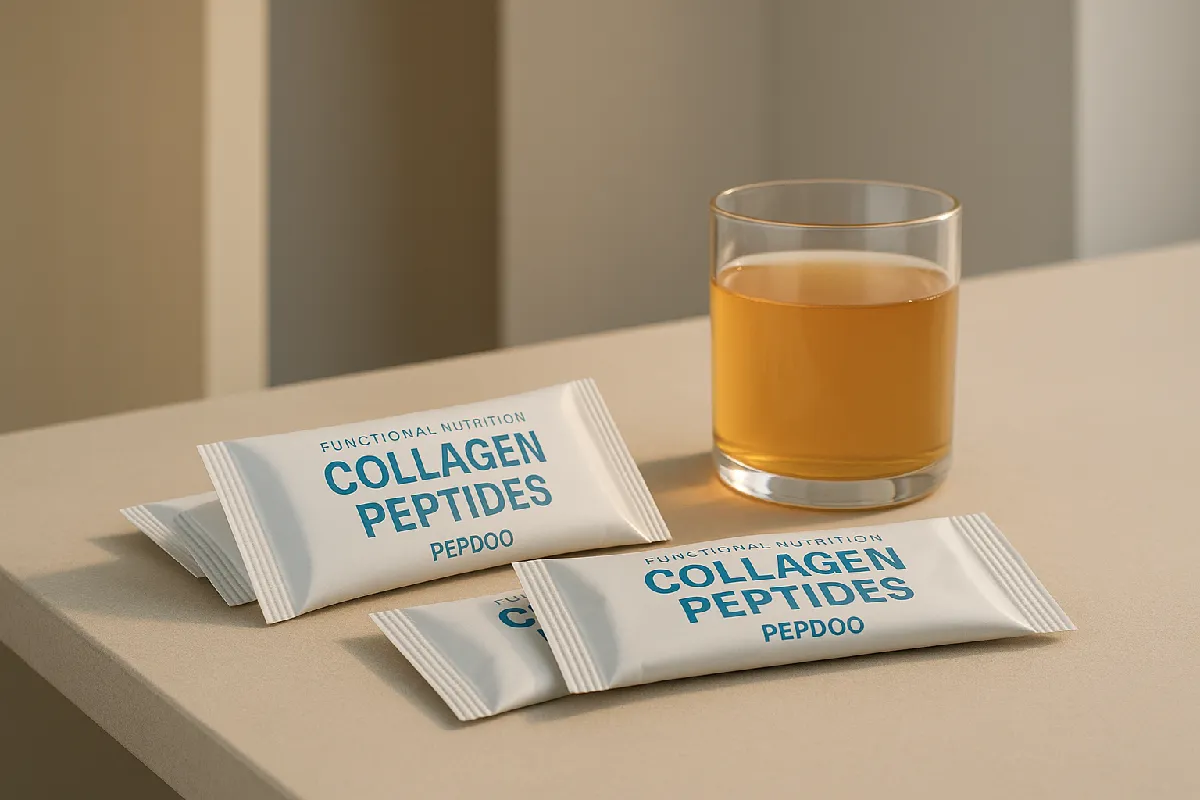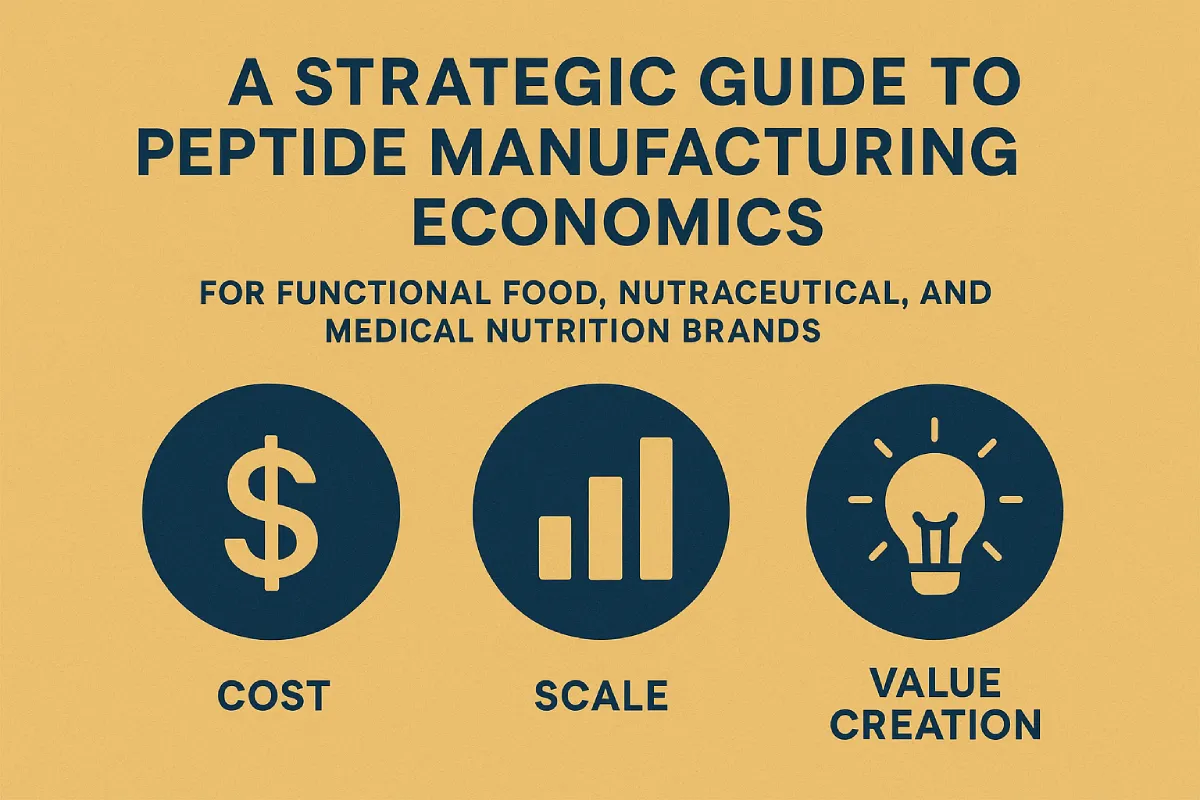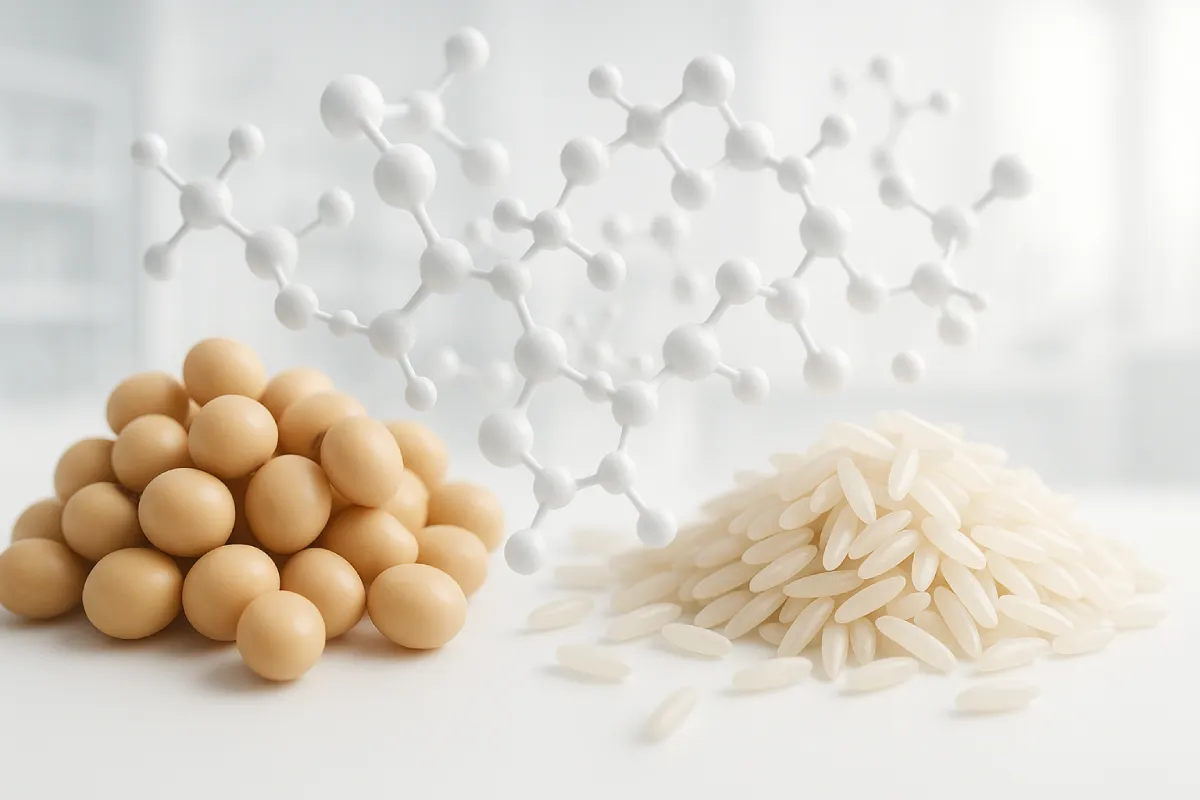Soy Peptides: A Plant-Based Solution for Cardiovascular Health
As global attention on plant-based nutrition continues to grow, soy peptides have emerged as a highly promising ingredient in functional nutrition, particularly for cardiovascular health. For B2B clients in functional foods, nutraceuticals, and medical nutrition products, understanding the scientific evidence, market potential, and supply chain advantages of soy peptides is critical for product innovation and strategic planning.
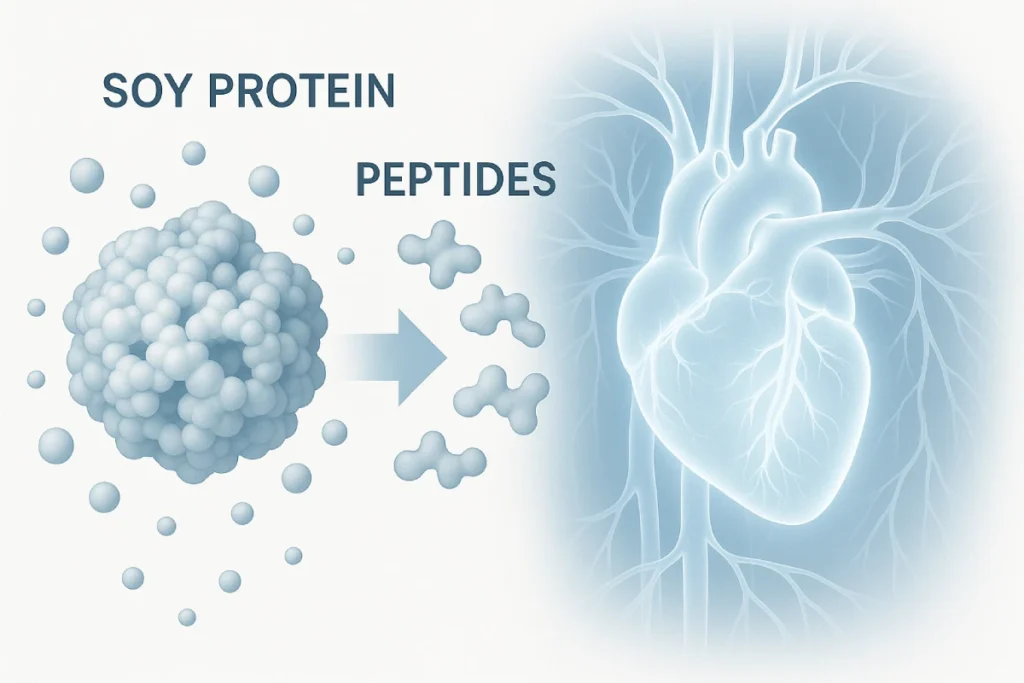
Why Soy Peptides Matter in Cardiovascular Health
What Are Soy Peptides?
Soy peptides are short chains of amino acids derived from soy protein, possessing various bioactive properties, including antihypertensive, antioxidant, and anti-inflammatory effects. Compared to intact soy protein, soy peptides have smaller molecular weights, which enhances absorption and bioavailability.
Company Advantage: Our company is a full-spectrum peptide manufacturer, a leading standard setter in China’s peptide industry, and holds numerous patents in small-molecule peptides. We employ advanced, internationally leading peptide production technologies to ensure high-quality, bioactive products.
Mechanisms of Action in Cardiovascular Health
Soy peptides contribute to cardiovascular health through multiple mechanisms:
- Blood Pressure Regulation: Certain soy peptides inhibit angiotensin-converting enzyme (ACE), which helps reduce blood pressure.
- Lipid Profile Improvement: Studies show soy peptides can lower total cholesterol and LDL cholesterol levels while supporting healthy HDL levels.
- Anti-Inflammatory and Antioxidant Effects: Soy peptides help reduce oxidative stress and inflammation, protecting cardiovascular tissues [1][2].
Scientific Evidence Supporting Soy Peptides
Clinical Studies and Meta-Analyses
Multiple clinical trials and meta-analyses have evaluated the cardiovascular benefits of soy peptides. For example, a meta-analysis found that soy protein consumption significantly improved triglycerides, total cholesterol, and C-reactive protein levels in individuals with type 2 diabetes, especially in higher-risk populations [1].
Regulatory Perspectives
The U.S. Food and Drug Administration (FDA) previously recognized that consuming 25 grams of soy protein per day may reduce the risk of coronary heart disease. While discussions continue regarding the precise health claims, the potential of soy protein and peptides for cardiovascular support remains well-recognized [2].
Applications of Soy Peptides in Functional Foods and Nutraceuticals
Product Formats and Dosage Forms
Soy peptides can be incorporated into a variety of products tailored for cardiovascular support:
- Beverages: Functional drinks, ready-to-drink protein beverages, and sports nutrition drinks.
- Solid Forms: Nutrition bars, capsules, and tablets.
- Powdered Products: Protein powders and functional supplement powders.
Regulatory and Labeling Considerations
B2B clients must account for differing regulatory requirements in target markets, including health claim substantiation and labeling compliance. Products should adhere to local standards such as GRAS (Generally Recognized as Safe) in the U.S. or EFSA guidelines in Europe.
Case Studies and Success Stories
- Clinical Nutrition Product in Asia: A medical nutrition brand incorporated small-molecule soy peptides to support hypertensive patients, showing measurable improvements in blood pressure and lipid profiles.
- European Functional Beverage Brand: Soy peptide powders were added to heart-health-focused drinks, enhancing functional claims and consumer adoption.
- Asian Nutraceutical Company: Inclusion of soy peptides in cardiovascular health capsules contributed to stronger product differentiation and increased post-launch sales.
These examples demonstrate the practical applications and market success potential for B2B clients integrating soy peptides into their portfolios.
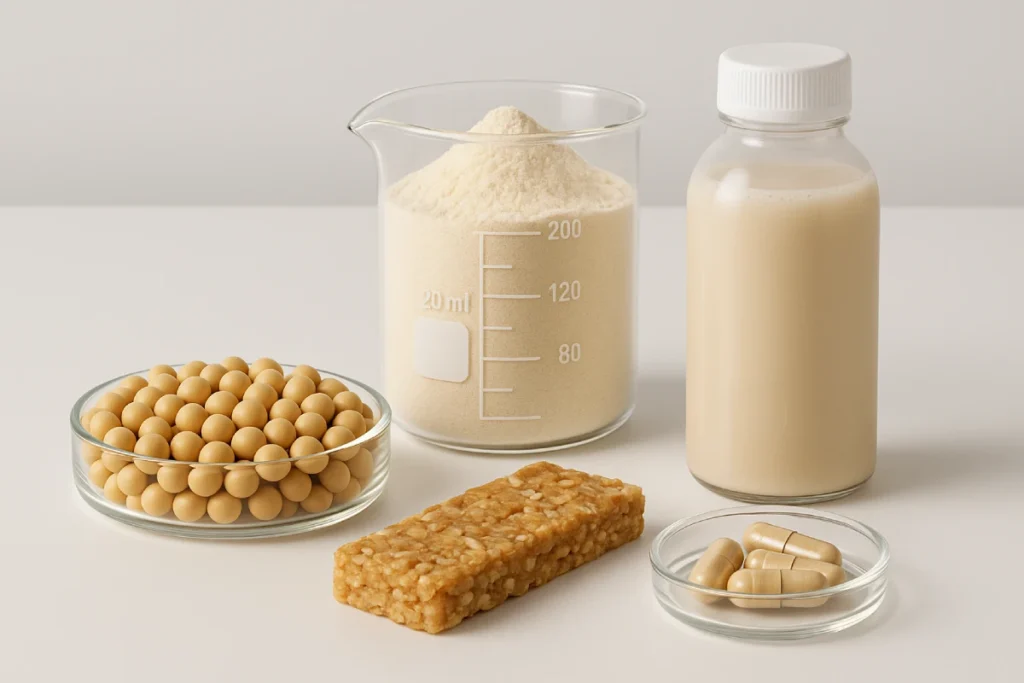
Choosing a Reliable Soy Peptide Supplier
Key Selection Criteria
B2B clients should consider the following when selecting a supplier:
- Technical Capability: Access to advanced peptide production technologies and robust R&D support.
- Quality Assurance: Compliance with international quality standards such as ISO and GMP.
- Supply Stability: Ability to provide consistent and timely raw material supply.
Our Company’s Strengths
As a full-spectrum peptide manufacturer, we offer several advantages:
- Industry Leadership: We help set China’s peptide industry standards, ensuring regulatory compliance and quality assurance.
- Patented Technologies: Our proprietary small-molecule peptide technologies ensure innovation and product differentiation.
- Advanced Production: Our processes integrate China’s leading and internationally advanced peptide manufacturing techniques for high bioactivity and consistency.
Summary and Strategic Insights for B2B Clients
Soy peptides, as plant-based functional ingredients, provide measurable benefits for cardiovascular health, including blood pressure regulation, lipid profile improvement, and antioxidant protection. For functional food, nutraceutical, and medical nutrition companies, leveraging the scientific evidence, product versatility, and reliable supply chains of soy peptides can strengthen product offerings, enhance market positioning, and drive innovation.
B2B clients are encouraged to explore partnerships with trusted, full-spectrum peptide manufacturers to access high-quality raw materials, technical support, and patented technologies, ensuring sustainable success in the competitive functional nutrition market.
Partner with a Leading Soy Peptide Manufacturer
Looking for high-quality soy peptides for cardiovascular health solutions? As a global peptide manufacturer and industry standard setter, PEPDOO® provides patented plant-based peptide innovations for functional foods and nutraceuticals.
Get a Custom Quote TodayFAQ
Soy peptides can be categorized by molecular weight (small-molecule peptides, medium-molecule peptides) and functional properties (ACE-inhibitory, antioxidant, lipid-regulating). Small-molecule peptides are often preferred due to higher bioavailability, stability in formulations, and compatibility with beverages, powders, and capsules.
Soy peptides contribute through multiple mechanisms: lowering blood pressure via ACE inhibition, improving lipid profiles (reducing LDL, supporting HDL), and providing antioxidant and anti-inflammatory effects. Clinical studies confirm measurable improvements in hypertensive and hyperlipidemic populations [1][2].
Soy peptides can be used in beverages (functional drinks, RTD protein drinks, sports drinks), powdered products (protein powders, functional supplement powders), and solid dosage forms (nutrition bars, capsules, tablets). Selection depends on target consumers, regulatory constraints, and formulation stability.
Yes. B2B clients must ensure compliance with local regulations regarding health claims, labeling, and ingredient approvals. Examples include GRAS certification in the U.S., EFSA-approved health claims in Europe, and local compliance standards in Asia. Experienced peptide suppliers can help navigate these efficiently.
Reliable supply depends on source reliability, quality control (ISO, GMP, HACCP), and manufacturing capability (advanced enzymatic hydrolysis and fermentation). Working with a full-spectrum peptide manufacturer ensures consistency and stability.
Yes. Leading suppliers offer custom peptide blends tailored for molecular weight, bioactivity, solubility, and flavor profiles, suitable for specialized functional foods, nutraceuticals, and medical nutrition products.
Several examples exist: Asian medical nutrition brands improved hypertensive patient outcomes; European beverage brands incorporated soy peptide powders enhancing adoption; Asian nutraceutical companies added peptides into cardiovascular capsules, achieving stronger differentiation and sales growth.
Advantages include access to patented technologies, regulatory guidance, stable supply chains, quality assurance, and technical support for innovation in functional product development.
References
- Moosavian, S. P., Rahimlou, M., Rezaei Kelishadi, M., Moradi, S., & Jalili, C. (2022). Effects of almond on cardiometabolic outcomes in patients with type 2 diabetes: A systematic review and meta-analysis of randomized controlled trials. Phytotherapy Research, 36(5), 1839–1853.
- Sirtori, C. R., Galli, C., & Montagnani, M. (2004). Soy protein and cardiovascular disease. Circulation, 102(20), 2555–2559.
- Anderson, J. W., Johnstone, B. M., & Cook-Newell, M. E. (1995). Meta-analysis of the effects of soy protein intake on serum lipids. New England Journal of Medicine, 333(5), 276–282.
- European Food Safety Authority (EFSA). (2010). Scientific Opinion on the substantiation of health claims related to soy protein and reduction of blood LDL-cholesterol concentrations. EFSA Journal, 8(6), 1745.


